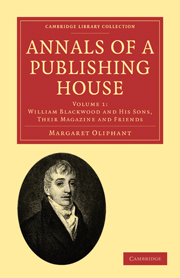Book contents
- Frontmatter
- PREFATORY NOTE
- Contents
- PORTRAITS
- CHAPTER I WILLIAM BLACKWOOD
- CHAPTER II THE TALES OF MY LANDLORD
- CHAPTER III THE MAGAZINE
- CHAPTER IV THE WORLD TURNED UPSIDE DOWN
- CHAPTER V JOHN GIBSON LOCKHART
- CHAPTER VI CHRISTOPHER NORTH
- CHAPTER VII THE ETTRICK SHEPHERD
- CHAPTER VIII WILLIAM MAGINN
- CHAPTER IX COLERIDGE—DE QUINCEY
- CHAPTER X JOHN GALT—JOHN WILSON CROKER
- CHAPTER XI OTHER CONTRIBUTORS: REV. DR CROLY—CHAPLAIN-GENERAL GLEIG—THOS. DOUBLEDAY—MRS HEMANS
CHAPTER X - JOHN GALT—JOHN WILSON CROKER
Published online by Cambridge University Press: 21 April 2011
- Frontmatter
- PREFATORY NOTE
- Contents
- PORTRAITS
- CHAPTER I WILLIAM BLACKWOOD
- CHAPTER II THE TALES OF MY LANDLORD
- CHAPTER III THE MAGAZINE
- CHAPTER IV THE WORLD TURNED UPSIDE DOWN
- CHAPTER V JOHN GIBSON LOCKHART
- CHAPTER VI CHRISTOPHER NORTH
- CHAPTER VII THE ETTRICK SHEPHERD
- CHAPTER VIII WILLIAM MAGINN
- CHAPTER IX COLERIDGE—DE QUINCEY
- CHAPTER X JOHN GALT—JOHN WILSON CROKER
- CHAPTER XI OTHER CONTRIBUTORS: REV. DR CROLY—CHAPLAIN-GENERAL GLEIG—THOS. DOUBLEDAY—MRS HEMANS
Summary
Perhaps the next contributor of importance, at least in the early days of the Magazine, was one whose great temporary reputation, very real while it lasted, fell for a long time into oblivion,—but is, we hope, rising again into a modest revival, to which the pretty and popular new edition of his works has lent an impulse. This was John Gait, a man of very different character from those sons of genius, with all their irregularities and occasional follies, whom we have already dealt with. Gait was very much more the sober type of the professional man of letters than any one of that light - hearted band who stumbled into literature as the best way of giving utterance to the boundless high spirits and superabundant power of utterance that was in them, without, to begin with, any serious thought whatever, either of what they had to say or of the consequences of saying it. Galt, with his curious, limited, but very remarkable talent, had always a serious purpose before him, and worked soberly for such modest fame as might be procurable, and the more substantial reward which helped him forward through the mingled course of his career—a little reputation which often helped him, and money which was of still greater use. His works were the first of their kind, and have been the model of all those successive works—always curiously popular in England as well as in Scotland, for it is difficult to tell what reason—which have expounded so often, and notably in our own day, the life from within of the Scottish peasant, with its humours and sagacities and roughnesses.
- Type
- Chapter
- Information
- Annals of a Publishing House , pp. 445 - 476Publisher: Cambridge University PressPrint publication year: 2010First published in: 1897



